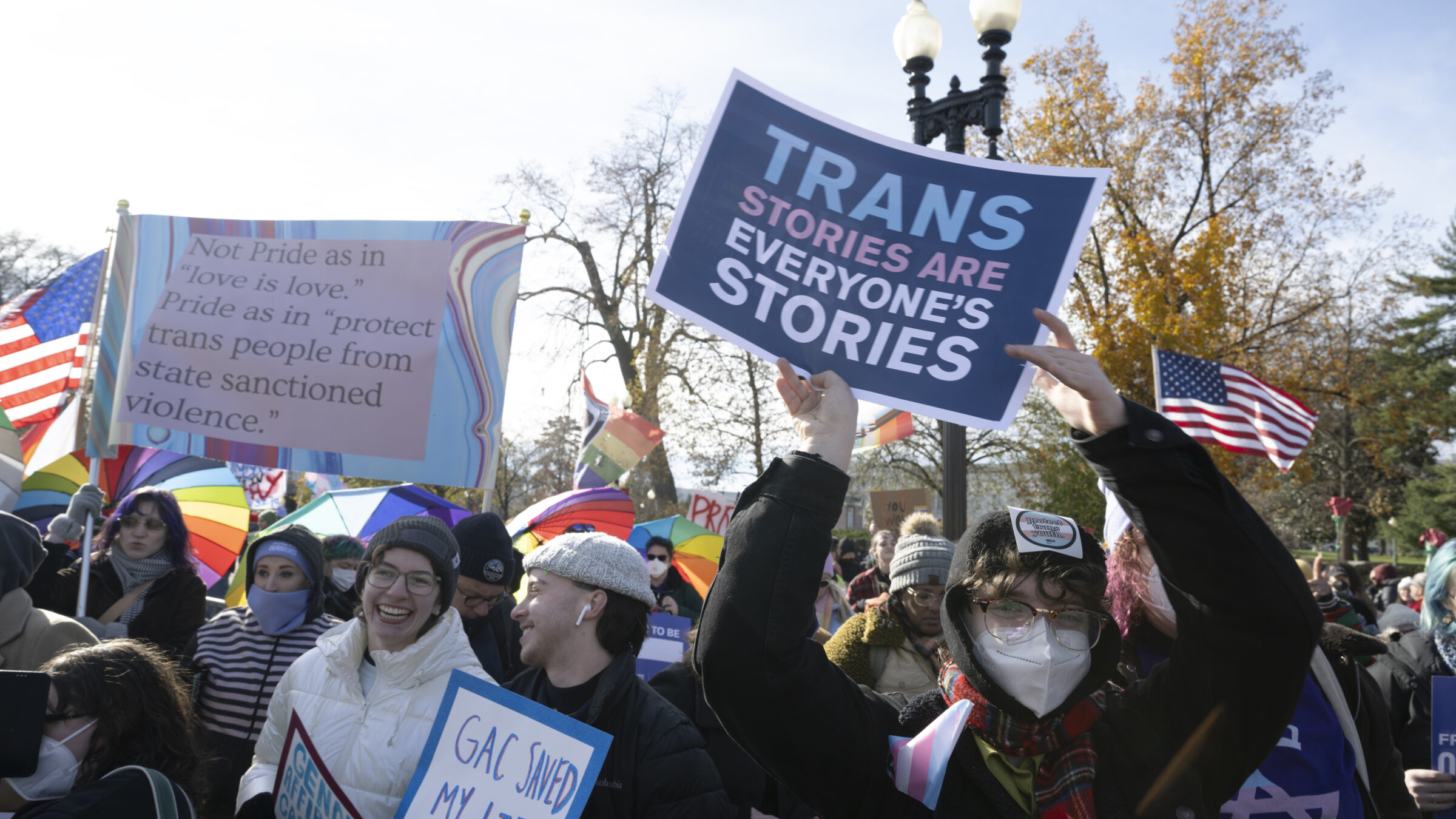The Supreme Court heard oral argument on Wednesday in United States v. Skrmetti, a case about Tennessee’s effort to deny healthcare to transgender children—and trans kids’ efforts to live free from discrimination. Last year, Tennessee Republican lawmakers enacted a law that prohibits medical providers from administering puberty blockers and hormone therapy to minors if the purpose of the treatment is to help the child live in a way “inconsistent with the minor’s sex.” Three Tennessean trans kids and their families sued, arguing that the law violates the Equal Protection Clause of the Fourteenth Amendment.
As the quoted text should make clear, Senate Bill 1 explicitly treats children differently on the basis of sex—discrimination that the Fourteenth Amendment prohibits. Under the law, for example, a teen assigned male at birth who wants testosterone to lower his voice can have it. A teen assigned female at birth cannot.
The effect of coerced gender conformity on transgender kids is particularly dire. One of the plaintiffs in Skrmetti, a 15-year-old trans boy identified as Ryan Roe, frequently vomited before school and stopped speaking in public because the sound of his voice caused so much discomfort. A 15-year-old trans girl identified as L.W. said she felt like she was drowning in her body, and regularly developed urinary tract infections because of the distress caused by sex-separated restrooms. A trans boy identified as John Doe became suicidal when he started menstruating around age 12.
Access to gender-affirming medical care dramatically improved all three children’s physical and psychological well-being. Senate Bill 1 is a direct threat to their health and safety. And in a very literal sense, the justices’ resolution of United States v. Skrmetti may determine whether some trans children live or die.
The conservative justices showed no signs of understanding those stakes during oral argument. They gave no indication of comprehending sex discrimination. No clue about what it means to be trans. Not the foggiest idea about how laws have discriminated against gender nonconforming people throughout American history. Frankly, they seemed to know nothing at all about the people whose lives they held in their hands. Worst, they appeared comfortable with using their ignorance to insulate discrimination against transgender people from the Constitution’s demand for legal equality.
Justice Amy Coney Barrett showcased her cluelessness during a discussion about intentional discrimination, questioning whether laws have previously discriminated against trans people in a way that warrants a closer look at new laws singling out trans people. “At least as far as I can think of, we don’t have a history of de jure discrimination against transgender people, right?” asked Barrett. “Is there a history that I don’t know about?”
There is, indeed, a history that she doesn’t know about—and a present for that matter, given that state lawmakers introduced 669 anti-trans bills in 2024. And for the first time in history, there was an openly trans advocate appearing before the Supreme Court who could explain as much: ACLU attorney Chase Strangio reminded Barrett of laws that explicitly exclude transgender people from military service, and introduced her to the concept of criminal bans on cross-dressing. These widespread laws were largely enacted between 1843 and 1952, and have at times been vigorously enforced. In the mid-20th century, trans people were criminalized for violating an informal “three-article rule,” so called because people needed to wear at least three items of appropriately gendered attire to avoid arrest. “I didn’t know about the statutes prohibiting cross-dressing,” said Barrett. Cross-dressing and military bans are only a small sampling of anti-trans laws, but I wouldn’t count on Barrett knowing much about those either.

(Photo by Marvin Joseph/The Washington Post via Getty Images)
What little information the conservative justices did have often came from an unreliable source. In 2020, the United Kingdom National Health Service commissioned a report on healthcare for trans teens. This report, known as the Cass Review, was released earlier this year and came out strongly against gender-affirming care for kids. In the months since, Republican legislators have frequently invoked the Cass Review as justification for anti-trans lawmaking. It has also been shredded by researchers, clinicians, and other experts for its departure from evidentiary standards, its transparent biases, and its lack of scientific rigor and integrity.
Justice Samuel Alito nonetheless held up the report as persuasive and repeatedly demanded that advocates respond to its claims. When Strangio mentioned the scientific consensus that the medical treatment decreases suicidality, Alito cut him off and turned to page 195 of the Cass Review. “It says: There is no evidence that gender-affirmative treatments reduce suicide,” Alito read. Strangio gently explained that the claim was limited to completed suicides, and did not include attempts or suicidal ideation more broadly. (Ironically, both the Cass Review and Alito departed from prevailing evidentiary standards, because when the Court hears an appeal, the justices are supposed to rely on the factual record developed in the lower courts. The Cass Review isn’t part of the Skrmetti record; it’s just part of Alito’s Google search history.)
Chief Justice John Roberts and Justice Brett Kavanaugh were more subtle about how their emptyheadedness endangers trans people. They acknowledged that there were things they didn’t know, but offered that up as an excuse to do nothing about the discrimination they do know is there. Roberts voiced concern about the propriety of the Court interfering in a “dispute between both sides” over evolving scientific standards. “Doesn’t that make a stronger case for us to leave those determinations to the legislative bodies rather than try to determine them for ourselves?” he asked. Kavanaugh later echoed these worries about a shifting debate: “If it’s evolving like that and changing, it strikes me as a pretty heavy yellow light, if not red light, for this Court to come in,” he said.
Justice Ketanji Brown Jackson recognized this reasoning as the trap that it is. “I’m getting kind of nervous,” she said, noting the parallels to Loving v. Virginia, the landmark 1967 Supreme Court case that struck down laws banning interracial marriage. There too, a state urged the Court to ignore a facially discriminatory classification to conclude that the Equal Protection Clause was not relevant to the statute. There too, the state said the only question for the Court to ask was if the state had a rational basis for enacting law, and pointed to putative scientific doubt and ongoing debates about the risks of the regulated conduct. So, there too, the state said the Court should stay out of the matter and defer to the legislature to exercise its own judgment. “In Loving, those same kinds of scientific arguments were made,” Jackson said. “I’m worried that we’re undermining the foundations of some of our bedrock equal protection cases.”
She’s right to worry. Her Republican colleagues on the bench may be playing the fool, but they know exactly what they’re doing. They’re undoing the progress of marginalized people’s movements. They’re using the power of the state to enforce conformity with their retrogressive views of sex and gender. They’re forcing trans people out of public life and rendering them unequal under law. The Constitution does not permit this. But the Court’s conservatives plan to permit it anyway.






